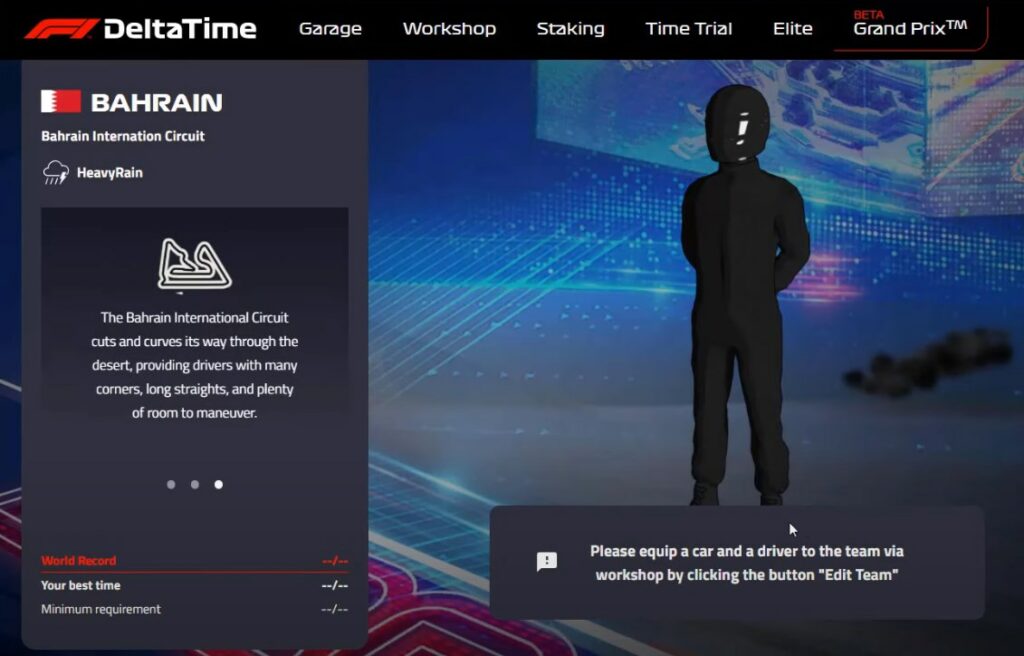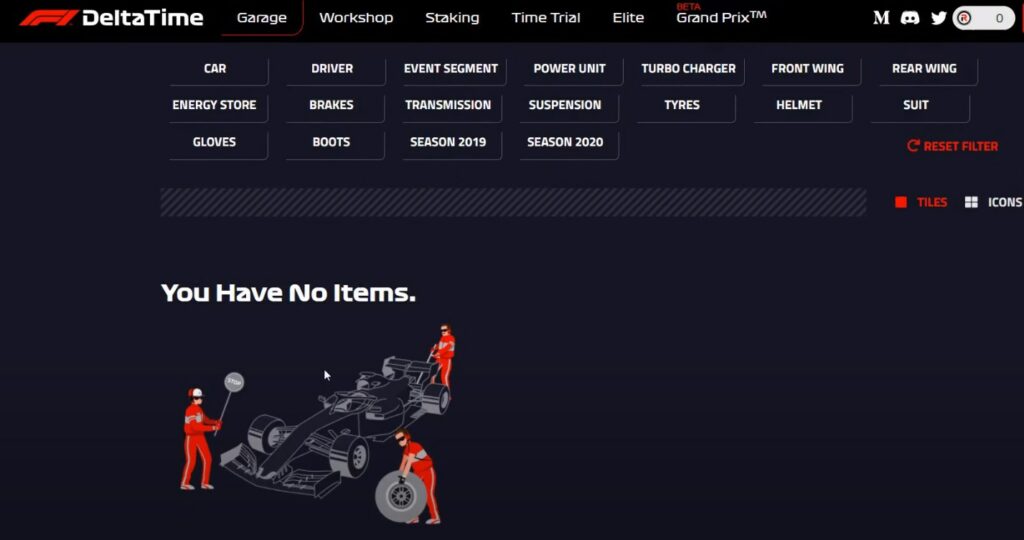Welcome to the thrilling world of Formula 1 racing. But wait, there’s a twist – we’re diving headfirst into the digital realm of F1 Delta Time (F1DT). This isn’t your ordinary racing game; it’s an innovative blend of motorsports and blockchain technology. So, buckle up!
F1 Delta Time is a blockchain-based game that revolutionizes the racing experience. Powered by the Ethereum blockchain, this game takes advantage of non-fungible tokens (NFTs) to provide an immersive, player-driven economy. F1DT offers the unique opportunity to own, trade, and race official Formula 1 digital assets on a global stage.
Exploring NFTs and their Relevance to Racing
So, what are these NFTs we keep mentioning? Non-fungible tokens represent unique, digital assets on the blockchain. Unlike fungible tokens like Bitcoin or Ethereum which are interchangeable, NFTs are unique and can’t be replaced. In the context of F1 Delta Time, NFTs are digital assets that players can buy, sell, and trade. These include cars, drivers, components, and even tracks – each with its unique characteristics and value.
The Intersection of Blockchain and Motorsports
The marriage between blockchain technology and motorsports is a game-changer. Blockchain provides the perfect platform for digitizing assets, ensuring their uniqueness, and allowing secure transactions. F1DT capitalizes on this, transforming the way fans interact with the world of Formula 1 racing.
A Deep Dive into F1 Delta Time NFT Brands
Racing F1 Delta Time NFT Brands takes the gaming experience to another level. Each NFT represents a unique digital asset associated with the F1 racing ecosystem. Here’s a breakdown:
Cars
F1DT offers a range of digital cars as NFTs. Each car has its unique attributes, such as top speed, acceleration, and grip, influencing its performance on different tracks.
Drivers
Each driver NFT has specific skills, impacting the car’s performance during a race. Skills include focus, aggression, and reaction times, affecting how a car maneuvers and responds during a race.

Components
Component NFTs include tires, gearboxes, and engines. Each has an impact on a car’s performance, and players can strategically equip these components to match race conditions.
Tracks
Yes, even the tracks are NFTs in F1DT! Each track has unique characteristics that influence the outcome of races.
The Impact on the Gaming Industry
The gaming industry is always evolving, and F1 Delta Time is leading the pack in innovation. By integrating NFTs into the gaming experience, the game has raised the stakes. This integration brings real-world value to digital assets, encouraging strategic gameplay and investment. It’s truly a game-changer.
The Future of F1 Delta Time
Looking to the future, the game is setting the pace for the adoption of blockchain in the gaming industry. As technology advances, we can expect to see even more integration of NFTs and gaming, with F1DT at the forefront. Who knows what thrilling turn we’ll take next on this digital racetrack?
A Deep Dive into NFT Brands
Tyres
Tyre NFTs are another integral part of the experience. The right set of tyres can make a difference in a race, affecting grip and overall performance. Players can choose the best tyres for a race, considering factors like weather and track conditions.
Gearboxes
Gearbox NFTs play a critical role in controlling the car’s speed. A high-quality gearbox can provide faster shifting times and improved car control, giving players an edge in the intense world of F1 racing.
Engines
Engine NFTs define the core of a car’s performance, impacting its top speed and acceleration. Investing in a high-performance engine NFT could be the key to securing victories in the game.

Player’s Economy in F1 Delta Time
F1 Delta Time isn’t just about racing; it’s an entire economy driven by the players. With its player-centric economy, individuals have the power to shape the in-game market dynamics. Let’s delve deeper into this fascinating aspect of the game.
Buying and Selling Assets
Every asset in F1 Delta Time can be bought or sold, creating a dynamic market where supply and demand dictate the value of NFTs. This opens up a new world of opportunities, turning virtual racing into a lucrative venture.
Earning Rewards
F1 Delta Time isn’t just about spending; it’s also about earning. Players can earn rewards by winning races and tournaments, adding another layer of excitement to the game.
Staking Tokens
Players can stake their REVV tokens – the in-game currency of F1 Delta Time – to earn passive rewards. This mechanic not only adds a financial strategy to the game but also allows players to get more out of their assets.
Impact on Blockchain Adoption
F1 Delta Time does more than just bring innovation to gaming; it plays a significant role in advancing blockchain adoption. It’s proof of how blockchain can create secure, decentralized, and player-driven economies, breaking away from the traditional gaming models.
Increased Transparency
Thanks to blockchain, everything in F1DT is transparent and verifiable. Players can track the history of an asset, and the decentralization of the platform ensures that no single entity has control over the game’s economy.
Empowering Players
F1 Delta Time empowers its players by giving them ownership of their assets. This means that the time and money they invest in the game can yield actual returns, a concept that is gradually reshaping the gaming industry.
Future Developments
The future looks bright for the game. With plans to introduce new features, enhance gameplay, and continue building the game’s economy, the team behind this groundbreaking game is dedicated to providing an exceptional experience for its players.
New Assets
New digital assets will continue to be released, expanding the range of cars, drivers, components, and tracks. Each new addition adds a layer of strategy to the game, encouraging players to think critically about their assets.
Enhanced Gameplay
The developers of F1 Delta Time are continuously working on improving the gameplay mechanics to provide a more immersive and realistic racing experience.
Growing Economy
The player-driven economy will continue to evolve, creating more opportunities for earning, trading, and strategizing. As more players join the game, we can expect to see the in-game economy thrive.
Broader Impact of F1 Delta Time on the Entertainment Industry
F1DT’s innovative approach doesn’t only change the landscape of gaming, but it also sets a precedent for the broader entertainment industry. Here’s how:
Reshaping Fan Engagement
The game offers a fresh way for fans to engage with their favorite sport. Instead of just watching the races, fans can actively participate, make strategic decisions, and even earn rewards. This enhanced level of engagement is likely to reshape how fans interact with sports and other forms of entertainment.
Creating New Revenue Streams
By allowing players to earn through gameplay, F1DT creates new revenue streams for its users. This model could potentially extend to other areas of entertainment, such as music, film, and art, opening up new ways for creators and consumers to monetize and value digital assets.
Understanding the REVV Token
The REVV Token is a crucial part of the F1 Delta Time experience. It serves as the main utility token within the game. But what does this mean? Let’s dive deeper:
Functionality of REVV Token
The REVV Token is used to purchase assets, pay entry fees for races, and earn rewards within the game. It also allows players to stake their tokens and earn additional REVV as rewards.
Trading REVV Token
REVV can be bought and sold on multiple cryptocurrency exchanges, allowing players to monetize their in-game earnings. As the game grows in popularity, the demand for REVV may increase, making it a potentially interesting aspect for cryptocurrency enthusiasts and investors.
F1 Delta Time – A Case Study for Future Games
With its successful integration of NFTs and blockchain technology, F1 Delta Time serves as a fascinating case study for future game developers. It demonstrates how traditional gaming elements can merge with cutting-edge technology to create an engaging and monetizable gaming experience.
Emphasizing Player Ownership
One of the key takeaways from F1DT is the importance of player ownership. By giving players ownership over their assets, the game gives users more control over their gaming experience, potentially increasing player retention and engagement.
Integrating Real-world Value
F1DT shows that integrating real-world value into gaming assets enhances the gameplay experience. This approach encourages strategic gameplay and could set a new standard for future games.
Leveraging Technology for Gaming Innovation
F1 Delta Time’s success highlights the potential of blockchain technology in gaming. Its innovative use of NFTs and blockchain technology could inspire other game developers to explore these technologies, leading to the development of more immersive and interactive games.
Conclusion
F1 Delta Time is more than just a game; it’s a glimpse into the future of gaming and entertainment. By seamlessly blending Formula 1 racing with blockchain technology and NFTs, it provides an innovative gaming experience that’s exciting, engaging, and potentially lucrative. As we gear up for the digital future, one thing is certain – F1 Delta Time is paving the way, and the ride is just getting started!
F1DT is revolutionizing the landscape of motorsports and gaming. It stands as a testament to the potential of blockchain technology, opening a gateway to the digital future of motorsports. Whether you’re a blockchain enthusiast, an avid gamer, or a die-hard Formula 1 fan, F1DT offers an experience that’s hard to resist. Let’s race to the future, shall we?
FAQ
Q1: What is F1 Delta Time?
A1: F1 Delta Time is a blockchain-based game where players can own, trade, and race official Formula 1 digital assets represented as non-fungible tokens (NFTs).
Q2: What are NFTs in F1 Delta Time?
A2: In F1DT, NFTs are unique digital assets that include cars, drivers, components, and tracks. Each NFT has unique characteristics and value within the game.
Q3: How does F1 Delta Time impact the gaming industry?
A3: By integrating NFTs, F1 Delta Time adds real-world value to digital assets within the game. It encourages strategic gameplay and opens a new revenue stream for gamers.
Q4: What is the future of F1 Delta Time?
A4: F1DT is set to lead the way in the adoption of blockchain technology in gaming. It presents a model for how NFTs can add real-world value and enhance the gaming experience.
Q5: Can I trade my NFTs from F1 Delta Time?
A5: Yes, players can trade their NFTs on various marketplaces, adding an additional element of strategy and potential income from gameplay.
Q6: What kind of NFTs are there in F1 Delta Time?
A6: F1DT has a wide range of NFTs, including cars, drivers, components like gearboxes, engines, tyres, and tracks. Each NFT has unique characteristics and impacts the gameplay in different ways.
Q7: How can players earn in F1 Delta Time?
A7: Players can earn in various ways in F1DT. They can win rewards by performing well in races and tournaments. They can also earn by selling their NFTs or staking their REVV tokens.
Q8: What role does blockchain play in F1 Delta Time?
A8: Blockchain is the backbone of F1 Delta Time. It ensures the security and transparency of all transactions, verifies the uniqueness of each NFT, and supports the game’s player-driven economy.
Q9: What future developments can we expect in F1 Delta Time?
A9: Future developments in F1DT include the introduction of new digital assets, improved gameplay mechanics, and continuous growth of the game’s economy.
Q10: Why should I play F1 Delta Time?
A10: F1DT offers a unique blend of thrilling motorsports and innovative blockchain technology. Players can engage in strategic gameplay, own unique digital assets, and participate in a player-driven economy. Plus, it’s a great way to experience the exhilarating world of Formula 1 racing.